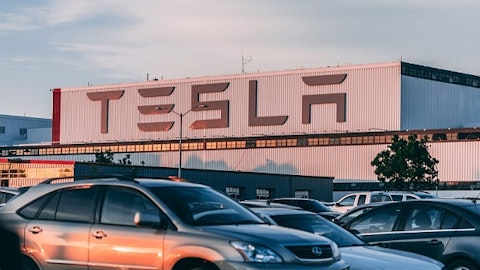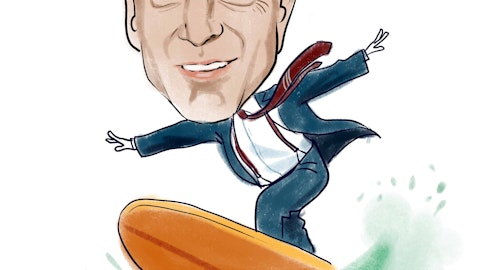Ensemble Capital Management, an investment management firm, published its fourth-quarter 2020 Investor Letter – a copy of which can be downloaded here. In the letter, they discussed the whole year performance of the fund in 2020 and also gave insights on the investment decisions they’ve made last year. You can view the fund’s top 10 holdings to have a peek at their top bets for 2021.
Ensemble Capital Management, in their Q4 2020 Investor Letter said that they consider Ferrari N.V. (NYSE: RACE) as one of the notable investments they have, and that it still has a wide room for growth and improvement. Ferrari N.V. is a banking, stock brokerage and wealth management company that currently has a $51.7 billion market cap. For the past 3 months, RACE delivered a 16.68% return and settled at $208.18 per share at the closing of January 29th.
Here is what Ensemble Capital Management has to say about Ferrari N.V. in their investor letter:
“Ferrari: “The most difficult part of my job is to say no.” – Enrico Galliera, Ferrari Chief Marketing and Chief Commercial Officer. Ferrari’s chief marketing officer finds himself in a unique position in his role in that he has to say no to customers who he has successfully persuaded to want to buy Ferrari’s product because of supply constraints.
Or its more accurate to say supply restraints since they are self imposed by the company in order to maintain the exclusivity of its products. And this for products that cost anywhere from hundreds of thousands to a few million dollars each at very high gross profit margins. That’s quite a bit of restraint!
As cited later in the interview, Galliera goes on to say that the $1.8MM LaFerrari Aperta, was “a gift” to Ferrari’s best customers. And though that terminology sounds strange, it truly was because shortly after those LaFerrari’s landed on the customers’ driveways… they were worth double or more!
Through its cars, Ferrari delivers exclusive and unique experiences to its customers. Whether it is in the product itself, derived from its high-performance race cars as it has been since its founding by Enzo Ferrari, or through the privilege of inclusion in an exclusive club offering its members unique driving and racing experiences, all connected by their shared passion, status, and ability to afford the luxury. It’s a super exclusive club at a global scale, providing members the opportunity to connect from across the globe. Both of these aspects are important to Ferrari buyers.
Ferrari has two sets of production models, those models called its “range models” produced at a few thousand units over their lives, and its limited “special” series models that number in the hundreds in total. While the range models are the majority of its roughly 10,000 total unit sales per year, they are still priced above $200,000 and can have waiting lists that are 12-18 months long.
The more limited series cars are available to Ferrari’s best repeat customers by invitation only. These are the most exclusive, highly desired, and most valuable models, that customers must work their way up the “best customers” list to attain. That distinction also results in invitations to special company hosted events such as exclusive track days and glamorous launch events in the company of peers from around the world. Given the investment to get onto the list for a limited or special series model, with its exclusivity and appreciation potential, customers extended the opportunity tend to be very reluctant to give up their orders, for fear of losing their spot in the future to others nipping at their heels to take their place.
The result of this demand management is a highly predictable, resilient, and profitable business model even during recessionary periods. In fact, during the Financial Crisis of 2008-2009 shipments only dropped 4% amidst an auto industry that saw a 15% fall in demand. In 2020, shipments declined only because of supply constraints due to factory and supplier shutdowns related to the pandemic, while orders have continued to be strong.
As you would expect, this business model is quite unique and can be very valuable if managed well. Ferrari’s management has done a great job in handling the delicate balance between maintaining exclusivity while also increasing the size of its customer base, production volumes, and profitability of the business.
Key to their success is always building fewer cars than are demanded in the market, which of course supports pricing of both the new cars as well as used models. These are classic Veblen goods; demand increases with price precisely because they are so hard or expensive to attain. Our own analysis concludes that over the long term, to maintain that exclusivity Ferrari has to manage the pricing for its cars by making sure it is growing pricing fast enough to keep up with the growth of its customers’ wealth. That’s a unique problem to have, yet as a Veblen good it benefits the customer, the company, and shareholders.
The results of such a unique business model and a complimentary management culture have been a very lucrative investment for its shareholders with the stock nearly quadrupling the S&P 500’s performance since its IPO in 2015.
Ferrari is unique in its heritage and appeal to millions of people around the world through its connection to F1 racing, which it has raced since the competition’s founding in 1950. This has to do with the roots of its culture, imparted by its founder Enzo Ferrari 70 years ago. He was passionate about racing and in founding his Scuderia Ferrari race team built his reputation by winning often and early in the automobile’s history. There is an authenticity in what Ferrari stands for and what it promises its customers.
The result of its very profitable business model means that the company is able to offer its employees a great work environment, benefits, and mission (if you’re passionate about cars and racing), including going the extra mile to protect them and take care of their families and communities during the COVID crisis in Italy. Ferrari also helped the communities it operates in and its suppliers, whom the company views as key partners in cutting edge engineering and materials. This approach has been great for shareholders as growth, profitability, and returns attest. It’s a win-win-win model, which we love because it represents an entity where all stakeholders want the company to succeed and are willing to go the extra mile to see that it does. The company managed its relationships with stakeholders so successfully during the pandemic that its efforts
were made into a case study by the Harvard Business School.Going forward, we think that Ferrari continues to do well. Their total addressable market has barely been scratched. About 2/3 of its buyers are repeat buyers while their customer base represents less than 1% of our estimate of potential customers.
Of course, many of these potential customers don’t care about Ferrari, sports cars, or racing, but still some number would consider buying their first Ferrari for the exclusivity or design. And existing customers will consider buying another if the company can leverage its technical and design expertise to better meet their unmet needs, such as including more practical form factors so that they can drive a Ferrari for more everyday use, or as is the case in China, be chauffeured by their driver. China is the fastest growing market for high net worth individuals and luxury vehicles while Ferrari is underpenetrated in the region. It presents a huge growth opportunity for the right set of products.
Environmental considerations are becoming more important to luxury buyers, especially younger ones, so moving towards offering hybrid and electric vehicles also expands the brand’s appeal and renews its relevance while benefiting Ferrari’s pricing power. One outcome of electrification is that performance improves and this has allowed Ferrari to introduce higher price points for its first production hybrid, the SF90 Stradale. Other high end sports car brands – Porsche being the pioneer in the high performance luxury SUV market with the Cayenne and Macan, and Lamborghini more recently with the Urus – have been successful at roughly doubling their volumes after introducing these more practical models, so we are bullish on the prospects of the Puro Sangue Ferrari “utility vehicle” expected to launch in late 2022.”

Last December 2020, we published an article telling that Ferrari N.V. (NYSE: RACE) was in 31 hedge fund portfolios. Its all time high statistics is 36. RACE delivered a decent 23.31% return in the past 12 months.
Our calculations show that Ferrari N.V. (NYSE: RACE) does not belong in our list of the 30 most popular stocks among hedge funds.
The top 10 stocks among hedge funds returned 216% since the end of 2014 and outperformed the S&P 500 Index ETFs by more than 121 percentage points. We know it sounds unbelievable. You have been dismissing our articles about top hedge fund stocks mostly because you were fed biased information by other media outlets about hedge funds’ poor performance. You could have doubled the size of your nest egg by investing in the top hedge fund stocks instead of dumb S&P 500 ETFs. Below you can watch our video about the top 5 hedge fund stocks right now. All of these stocks had positive returns in 2020.
Video: Top 5 Stocks Among Hedge Funds
At Insider Monkey we scour multiple sources to uncover the next great investment idea. For example, Federal Reserve has been creating trillions of dollars electronically to keep the interest rates near zero. We believe this will lead to inflation and boost real estate prices. So, we recommended this real estate stock to our monthly premium newsletter subscribers. We go through lists like the 10 most profitable companies in the world to pick the best large-cap stocks to buy. Even though we recommend positions in only a tiny fraction of the companies we analyze, we check out as many stocks as we can. We read hedge fund investor letters and listen to stock pitches at hedge fund conferences. You can subscribe to our free daily newsletter on our website.
Suggested Articles:
- Billionaire David Tepper’s Top Stock Picks
- 10 Best Quantum Computing Stocks To Buy
- 14 Best European Dividend Stocks To Buy
Disclosure: None. This article is originally published at Insider Monkey.





